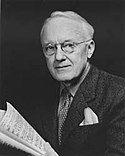Randall Thompson
 | |
| Imię i nazwisko | Ira Randall Thompson |
|---|---|
| Data i miejsce urodzenia | |
| Pochodzenie | |
| Data i miejsce śmierci | |
| Gatunki | |
| Zawód | |
| Odznaczenia | |
Ira Randall Thompson[1] (ur. 21 kwietnia 1899 w Nowym Jorku, zm. 9 lipca 1984 w Bostonie[2][3]) – amerykański kompozytor i pedagog.
Życiorys
Syn nauczyciela języka angielskiego[2]. W dzieciństwie uczył się gry na organach, uczęszczał do Lawrenceville School w Nowym Jorku[2]. W latach 1916–1920 studiował na Harvard University u Archibalda Thompsona Davisona, Edwarda Burlingame’a Hilla i Waltera Spaldinga[1][2][3]. W 1921 roku odbył prywatny kurs u Ernesta Blocha w Nowym Jorku[1][2]. W 1922 roku uzyskał tytuł Master of Arts[1][2][3], w tym samym roku otrzymał stypendium za preludium Pierrot and Cothurnus i wyjechał do Rzymu, gdzie uczył się w Asolo u Gian Francesco Malipiera[1]. Wykładał w Wellesley College (1927–1929 i 1936–1937), Uniwersytecie Kalifornijskim w Berkeley (1937–1939), Curtis Institute of Music w Filadelfii (1939–1941), University of Virginia w Charlottesville (1941–1946), Princeton University (1946–1948) i Harvard University (1948–1965)[1][3]. Jego uczniami byli m.in. Leonard Bernstein i Lukas Foss[1][3]. Opublikował pracę College Music (Nowy Jork 1935)[1][2][3].
Dwukrotny laureat stypendium Fundacji Pamięci Johna Simona Guggenheima (1929 i 1930)[1][3]. Od 1938 roku był członkiem National Institute of Arts and Letters[1][3]. Odznaczony został Orderem Zasługi Republiki Włoskiej w stopniu kawalera (1959)[2].
Twórczość
Był przedstawicielem nurtu neoklasycznego w muzyce amerykańskiej[1]. Uprawiał przede wszystkim twórczość wokalną, poprzez użycie techniki kontrapunktu nawiązując do muzyki renesansowej[1]. Język muzyczny Thompsona odznaczał się diatoniką i prostotą środków wyrazu, w niektórych utworach kompozytor wykorzystywał nawiązania do muzyki ludowej i jazzu[1].
Ważniejsze kompozycje
(na podstawie materiałów źródłowych[1][2])
Utwory orkiestrowe
- 3 symfonie (I 1929, II e-moll 1931, III a-moll 1949)
- preludium Pierrot and Cothurnus (1922)
- preludium symfonicznie The Piper at the Gates of Down (1924)
- Jazz Poem na fortepian i orkiestrę (1928)
- fantazja symfoniczna A Trip to Nahant (1954)
Utwory kameralne
- All on a Summer’s Eve na skrzypce lub wiolonczelę i fortepian (1917)
- Septet na flet, klarnet, kwartet smyczkowy i fortepian (1917)
- Kwintet na flet, klarnet, altówkę, wiolonczelę i fortepian (1920)
- Scherzino na flet piccolo, skrzypce i altówkę (1920)
- The Wind in the Willows na kwartet smyczkowy (1924)
- 2 kwartety smyczkowe (I d-moll 1941, II G-dur 1967)
- Trio na 3 kontrabasy (1949)
- Wedding Music na kwartet smyczkowy i kontrabas ad libitum (1971)
Utwory fortepianowe
- Allegro (1918)
- Indianola Variations na 2 fortepiany (1918)
- 2 scherza (1921, 1921)
- Varied Air (1921–1922)
- 2 sonaty (1922, 1922–1923)
- Suita (1924)
- The Boats were Talking (1925)
- Mazurka (1926)
- Song after Sundown (1935)
- Little Prelude (1935)
Utwory na chór a cappella
- The Last Invocation (1922)
- 5 Odes of Horace na 4–7-głosowy chór męski (1924)
- 2 Amens (1927)
- Pueri hebraeorum na 8-głosowy chór żeński (1928)
- Rosemary na 3–4-głosowy chór żeński (1929)
- The Peaceable Kingdom na 4–8-głosowy chór (1936)
- Tarantella: Do you Remember an Inn, Miranda? na chór męski (1937)
- The Lark in the Morn (1938)
- Alleluia (1940)
- Now I Lay me down to Sleep na chór żeński (1947)
- Felices ter: Horace Ode for A.T. Davison (1953)
- Mass of the Holy Spirit na 4–12-głosowy chór (1955–1956)
- Requiem na podwójny chór (1957–1958)
- Glory to God in the Highest (1958)
- The Gate of Heaven na chór żeński lub męski lub mieszany (1959)
- The Best of Rooms (1963)
- motet The Eternal Dove (1968)
- 2 Herbert Songs (1970)
- Farewell (1973)
Utwory wokalno-instrumentalne
- Americana na 4–8-głosowy chór i fortepian (1932, zorkiestrowane 1940)
- Tarantella na chór męski i fortepian lub orkiestrę (1937)
- The Testament of Freedom na chór męski lub mieszany i fortepian lub orkiestrę lub orkiestrę dętą (1943)
- The Last Words of David na chór mieszany lub męski i orkiestrę lub fortepian (1949)
- Ode to the Virginian Voyage na chór i orkiestrę (1957)
- 7 pieśni Frostiana na 3–7-głosowy chór i fortepian lub orkiestrę (1959)
- The Lord is my Shepherd na chór żeński i fortepian lub organy lub harfę (1962)
- A Feast of Praise na chór, instrumenty dęte blaszane i harfę lub fortepian (1963)
- Hymn: Thy Book Falls Open na chór i organy lub zespół instrumentów (1964)
- oratorium The Passion According to St Luke na 2 głosy solowe, chór i orkiestrę (1965)
- kantata A Psalm of Thanksgiving na chór dziecięcy, chór i orkiestrę lub fortepian lub organy (1967)
- The Place of the Blest na chór chłopięcy lub żeński i fortepian lub orkiestrę kameralną (1969)
- A Hymn for Scholars and Pupils na chór żeński, orkiestrę kameralną i organy lub chór, flet, 2 trąbki, puzon, organy i smyczki (1973)
- A Concord Cantata na chór i fortepian lub orkiestrę (1975)
Opery
- opera Solomon and Balkis (1942, wyk. radio CBS Nowy Jork 1942, wyst. Cambridge 1942)
- dramat muzyczny A Nativity According to St Luke (1961, wyst. Cambridge 1961)
Balet
- Jabberwocky (1951)
Muzyka do sztuk teatralnych
- Torches (1920)
- Grand Street Follies (1926; niezachowana)
- The Straw Hat (1926)
- The Battle of Dunster Street (1953)
Przypisy
- ↑ a b c d e f g h i j k l m n Encyklopedia Muzyczna PWM. T. 11. Część biograficzna t–v. Kraków: Polskie Wydawnictwo Muzyczne, 2009, s. 86. ISBN 978-83-224-0905-3.
- ↑ a b c d e f g h i Baker’s Biographical Dictionary of Musicians. T. Volume 6 Stre–Zyli. New York: Schirmer Books, 2001, s. 3632–3633. ISBN 0-02-865571-0.
- ↑ a b c d e f g h Jonathan D. Green: A Conductor’s Guide to Choral-Orchestral Works. Lanham: The Scarecrow Press, 2003, s. 220–221. ISBN 0-8108-4720-5.
Media użyte na tej stronie
Photo of Randall Thompson
nastrino della medaglia di cavaliere dell'Ordine al merito della Repubblica italiana

